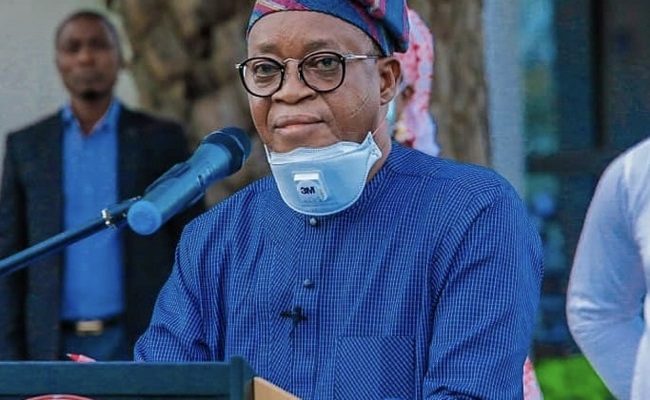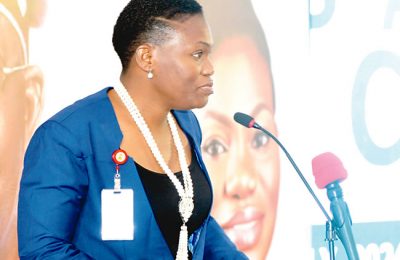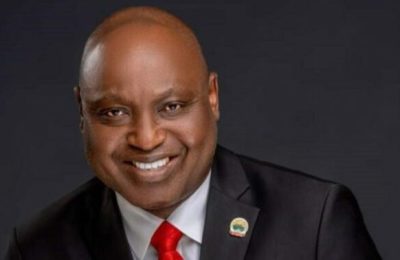Following calls for the unbundling of the transportation ministry by maritime stakeholders, President Bola Tinubu created the Ministry of Marine and Blue Economy. In this report, TOLA ADENUBI examines hurdles before the new minister.
President Bola Tinubu, at the weekend, announced the appointment of former governor of Osun State, Gboyega Oyetola, as the Minister of Marine and Blue Economy, a ministry that will be saddled with the task of harnessing Nigeria’s potential in the maritime sub-sector of the economy.
The marine and blue economy ministry, which had over the years been subsumed under the Federal Ministry of Transportation, had suffered undue attention as successive ministers had focused more on the rail aspect of the ministry’s responsibility, thereby leaving many stones untouched as the nation continued to suffer losses in revenue from its blue economy sub-sector.

However, with a separate ministry now handling core maritime issues, following the creation of the Ministry of Marine and Blue Economy, expectations for deliverables are high as the new minister sets out to face the task of harnessing the nation’s maritime potential.
The following setbacks are core for the minister of marine and blue economy as he sets out to make an indelible mark in the nation’s maritime industry:
Collapsing ports

The state of decay of many ports in Nigeria is already alarming, especially the Tin-Can Island Ports in Lagos. The Nigerian Ports Authority (NPA), for most part of late 2022 and early this year, have been raising alarm that the ports need complete rehabilitation.
Managing Director of the NPA, Mohammed Bello-Koko, during an interview, said there is imminent collapse in the ports if nothing is done in the next few years.
According to the NPA MD, “Our estimate on what we need to repair at the ports is currently between $560 million and $800 million. Now that gap is because if we decide to leave Apapa port till some other time, we do not need $800 million but we need to also reconstruct Tin-Can port, as we are reconstructing other places; we need about $800 million.
“We have increased our revenue from N260 billion to N361 billion. Our contribution to CRF has increased to N91 billion and we believe that this year, we will do far better than that.”
With a new minister in charge of maritime affairs, it is expected that the issues surrounding collapsing ports in Nigeria will be addressed before the end of 2023.
Single window
The Nigerian maritime sector is due for a single window platform where functions of all government agencies operating at the nation’s ports are domiciled in one single document.
Port users over the years have been subjected to rigorous port processes that have led to payment of huge fees because the port is housed to many agencies of government, answerable to different ministries, both at the federal and state level.
Due to a litany of government agencies answerable to different ministries of government, many issues till date have remained unresolved. Notable amongst such issues plaguing the ports are prevalence of overtime cargoes at the nation’s ports, amongst others.
While the Nigeria Customs Service (NCS), the agency of government that has the final say on evacuation of overtime cargoes from the ports, answers to the Federal Ministry of Finance, the Nigerian Ports Authority (NPA), the agency that feels the pain of the menace of overtime cargoes inside the port, used to answer to the Federal Ministry of Transportation until now due to the creation of the Federal Ministry of Marine and Blue Economy.
With agencies like Customs, NPA, Nigerian Immigration Service (NIS), Nigeria Agricultural Quarantine Service (NAQS), National Agency for Food and Drug Administration and Control (NAFDAC) and the Nigerian Drug Law Enforcement Agency (NDLEA) all domiciled in the ports but answering to different ministries of the Federal Government, port users have been exposed to all sorts of irregularities in terms of payments during cargo clearance processes.
With a new ministry solely in charge of maritime, expectations are now high on the new minister to push for the establishment of a single window platform that will eradicate human-to-human interface at the ports while, at the same time, collapsing the different functions of all the government agencies inside the ports under one document.
CVFF disbursement
The Cabotage Vessel Financing Fund (CVFF) is a fund domiciled in the Cabotage Act 2003. Its primary aim is to improve indigenous tonnage in terms of capacity in order for Nigerian ship-owners to compete favourably with their foreign counterparts.
Since the enactment of the Cabotage Act in 2003, the CVFF, which has now accrued to around $700 million (dollar component) has not been disbursed for once, leaving many indigenous ship-owners to lack adequate capacity to compete in the cabotage regime.
With many indigenous vessel owners lacking capacity, Nigeria is currently suffering huge losses in terms of capital flight loss as a result of the dominance of the nation’s cabotage regime by foreign vessel owners.
The establishment of a new ministry solely in charge of marine and blue economy means that much emphasis will be placed on the prompt disbursement of the CVFF fund to indigenous ship-owners, giving the fact that the last administration of President Muhammadu Buhari had already carried the disbursement process up to a logical stage, with five Primary Lending Institutions (PLI’s) already identified.
With the $19.5 billion Dangote refinery already working and preparing to hit the market with its first product, the new minister must, as a matter of urgency, see to the address of inadequate indigenous capacity among local ship-owners in the country.
IMO election
It has been almost 15 years since Nigeria last won election into the prestigious council seats of the International Maritime Organisation (IMO), the United Nations arm saddled with the regulation of maritime activities globally.
Since the victory of 2009, Nigeria has lost out in IMO council elections of 2011, 2013, 2017, 2019, 2021, with the country excusing itself from the 2015 election process.
The IMO Council is the decision-making body of the United Nations specialised agency responsible for regulating the global maritime industry.
The countries elected into Category A of the IMO consist of countries with the largest interest in providing international shipping services.
Those elected into Category B are those with the largest interest in international seaborne trade.
Category C members are those that are not eligible for election into either Category A or B, but are countries that have special interests in maritime transport or navigation and whose election to the council will ensure the representation of all major geographic areas of the world.
With a separate ministry handling maritime issues, it is expected that the time is now for Nigeria to break the almost 15-year-old jinx of missing out in elections into the decision-making councils of the IMO.







